Messaging apps are great for sharing pictures with friends or family, making plans, and staying in touch. WhatsApp is one of the most popular of these and with more than 2 billion users.
For all of its popularity, WhatsApp is not without disadvantages. A recent update saw the introduction of new privacy guidelines which users must accept. These allow the company to share your messages with Facebook which promises to protect them from prying eyes. Unfortunately, no mention is made of the other information that will be evaluated, including your devices, connections, usage, protocols, and location.
Searching for Alternatives
Given the above, it isn't surprising that many WhatsApp users are looking for alternatives. We selected five of the most popular and checked them out for you. These offer similar features to WhatsApp, a few extras, and some different approaches to data security and privacy.
What Does 'Secure' Mean?
When it comes to messaging apps, it can be hard to find out if they're secure or not. Trustworthy apps offer users background privacy protection and are rarely seen or noticed. The minimal standards include:
End-to-end encryption: Nearly all well-known messaging apps claim to provide "End-to-End encryption" (E2E). This guarantees that nothing you send or receive can be seen by third parties. All data is encrypted before it's sent to a recipient, whereafter, it's decrypted and viewed. Some apps offer E2E but don't activate it by default, requiring users to turn it on under settings.
Open-source code: Providers that use open-source code enjoy extra trust. It allows specialists to check exactly how the service works, what runs in the background, and even identify areas for improvement. This is in contrast to most proprietary software, the code for which remains confidential. With such apps, no one knows how they operate on a smartphone or mobile device in practice.
No data collection: Encryption doesn't mean a thing if user metadata is harvested and sold. This metadata includes information about your contacts, call and chat sessions, devices, IP addresses, and much more.
Automatic deletion and shredding of messages: Many messaging apps allow users to set an automatic expiration date for messages. This deletes the information at a specified time. But not all deletion is equal. For us, only messages that can't be reconstructed with special tools count as being truly deleted. Some services offer a shredder feature that completely deletes sent texts, images, videos, and voice messages.
Signal
Recommended by Edward Snowden and numerous security/data privacy experts, Signal is considered one of the best messaging apps on the market, offering everything expected from a modern messenger.
It was developed in 2018 by the Signal Foundation as an open-source app and is primarily financed through donations. Official user numbers have not been released to date, however, during an interview with The Verge, representatives confirmed that as of January 2021, more than 40 million people used it.
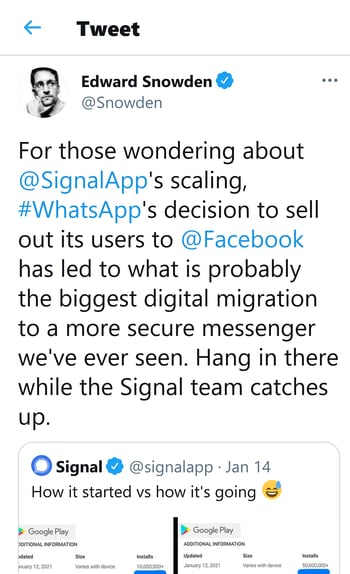
Signal is Edward Snowden's messenger of choice.
Signal's Security
Security is Signal's top priority. Messages are sent with E2E, and even stickers are coded. In addition, you can set a password to protect your messages in the event that you lose your phone.
Unlike other messenger apps Signal only saves as much metadata as is necessary for the app to smoothly function, like telephone numbers, random keys, and profile information.
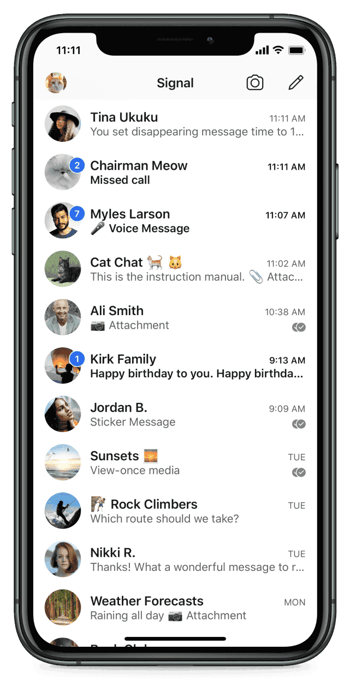
If you're familiar with WhatsApp, you won't need long to adjust to Signal.
Features
Signal can do everything that WhatsApp can, except publish stories or create automatic cloud backups. Instead, you can react to individual messages with emojis, automatically pixelate faces on pictures, and set messages to delete after a certain period of time. With an account, the service can be used on a mobile device and up to five desktops.
Whenever you switch your phone number, things with Signal get a bit more complicated. Not all of your contacts are automatically notified, and you'll need to be manually re-added to your groups.
Risks
It sounds too good to be true, but Signal doesn't have too many risks. The service doesn't gather any data, since the foundation behind the messenger has no need to generate profits.
End-to-end encryption
Password protects your messages
Doesn't collect user data
No automatic updates after changing your telephone number.
Telegram
Telegram was created by the Russian brothers Nikolai and Pavel Durov and launched in 2013 as open-source software. Nikolai and Pavel had earlier founded the Russian social network, VK (previously, VKontakte). Their latest non-profit venture seeks to provide maximum anonymity and privacy. According to official releases, the core development team (around 15 people) is based in Dubai.
On the heels of WhatsApp's new privacy policy, Telegram enjoyed a boom in popularity, counting around 500 million people among its user base.
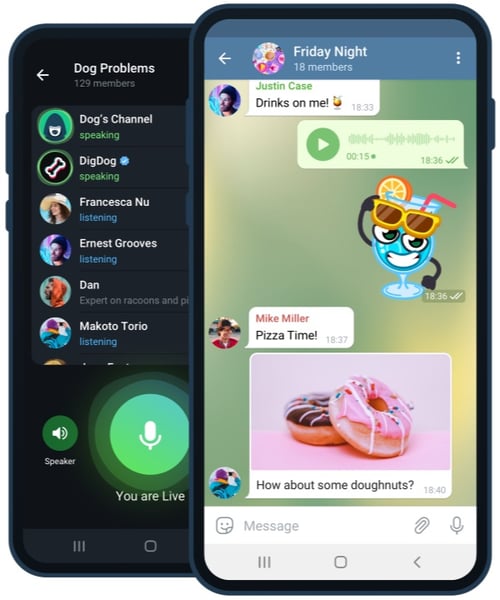
Telegram is fun to use and offers lots of options.
Security
Telegram has been prohibited in Russia since 2018 after the app's developers refused to provide the Russian Government with its encryption codes. Many took this as proof of Telegram's commitment to its users' privacy. However, E2E does need to be manually activated under settings.
As with Signal, you can password-protect your messages, which comes in very handy should you lose your smartphone. Two-factor authentication is also offered, using an SMS code and a password.
Another advantage to using Telegram is that you don't need to enter your real phone number.
Features
If using Telegram, you won't have to give up any of the features that you're accustomed to from WhatsApp. Telegram groups can host up to 200,000 members, and there are no subscription limits. Like other messengers, Telegram offers automatic deletion for messages as well as accounts and all associated media after a period of non-use. It's possible to use Telegram simultaneously on multiple devices.
Risks
As mentioned above, E2E needs to be manually activated, since otherwise, only your communication with the Telegram server will be encrypted. Telegram justifies this by noting that if automatically activated, it wouldn't be possible to restore messages should the device be lost. While this might be convenient, it isn't great from a security point of view.
We're also skeptical about Telegram's MTProto protocol. Instead of utilizing an established protocol like Signal, the company developed its own, which has undergone less testing and isn't as well-established.
End-to-end encryption
Password protection for messages
Two-factor authentication
Possible to create groups with up to 200,000 members
Allows large files to be sent
End-to-end encryption needs to be manually activated.
Uses its own MTProto protocol instead of a more established option.
Threema
Unlike most other services on this list, Threema isn't free. In exchange, the Swiss app promises users cutting-edge security. In contrast to WhatsApp, open-source software fulfills all legally mandated data protection requirements.
The app was developed in 2012 by Manuel Kasper. According to Threema GmbH, all of its servers are housed in Switzerland. When it comes to its user base, Threema is one of the smaller alternatives to WhatsApp, only having around 9 million users.
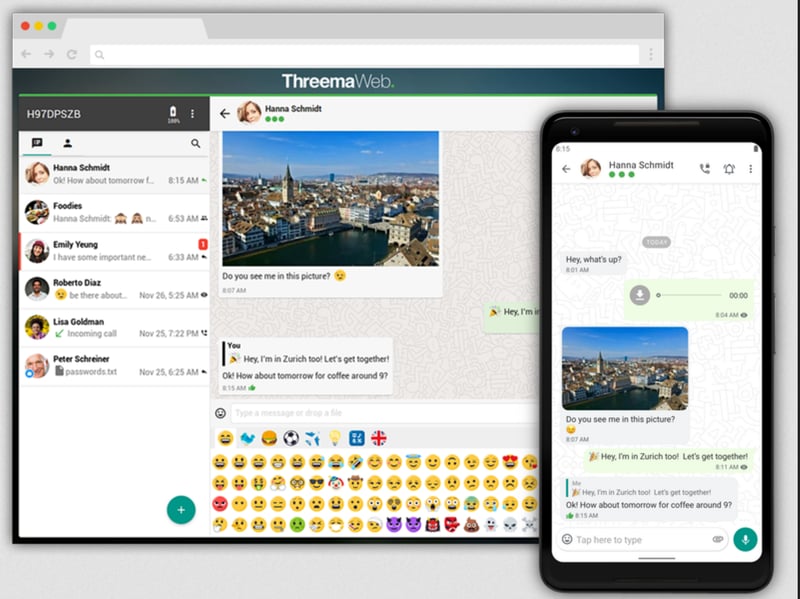
Threema looks similar to WhatsApp, but isn't free.
Security
E2E is enabled by default and it's possible to communicate with complete anonymity. All users are assigned a randomly generated ID that's visible to others. Should you want to personalize your experience, you can add your real name, but this is optional. Similarly, Threema only compares telephone numbers and email addresses in your phone by request, to see if they correspond to any existing users.
The service doesn't permanently store any data: Groups and contacts are stored on individual phones, not the app's servers. After delivery, all messages are deleted, leaving no traces. Only as much metadata is saved as is needed for the app to properly function.
Features
Communicating works similarly with Threema as it does with WhatsApp, and users get most of the same features. Following its most recent update, a number of new features were introduced. One of these is the ability to filter chats for keywords. Sending media has been made easier thanks to a convenient search tool.
Apart from that, you can access your account from your smartphone or desktop. According to the developer's recent statements, they are currently working on a multi-device solution.
The service is also interesting for companies thanks to the separate Threema Work Messenger.
Risks
We are not aware of any risks associated with Threema. The developer greatly values security, regularly submitting its software to external audits. Overall, Threema offers maximum anonymity and securely encrypts all user data. This is because the company sells an app, not your information.
End-to-end encryption
Doesn't store any data
Saves a minimum amount of metadata
No free version
Wire
In the clash of the messenger titans, Wire shuffles around in the background. Like Threema, the app is Swiss and was launched in 2014. Owned by Wire Swiss, in the middle of 2019, the company's holding company, Wire Group Holding Inc, moved from Luxembourg to the US.
Wire hasn't released any official subscriber numbers, but estimates range from 500,000 to 5 million. However, the company caters primarily to businesses and organizations, offering a powerful, Pro plan, which supports both telephone and video conferencing. For larger companies, there's also Wire Enterprise, which provides a data cloud and individual branding. Unlike other messaging apps, Wire can be used without a smartphone.
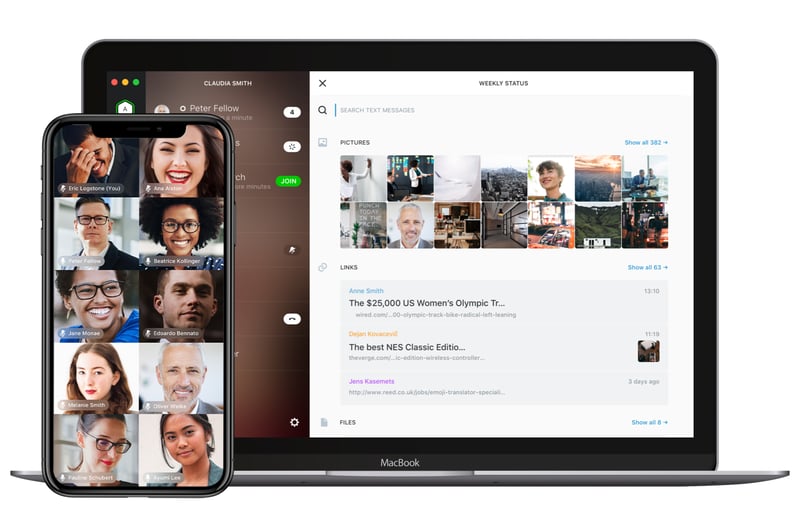
Wire's Pro version caters to business customers.
Security
Wire hypes itself as being as sleek as WhatsApp while offering the security of Signal. All communication is encrypted with E2E, and the program itself is open-source. Wire has submitted to two independent audits, completing the most recent one in 2017.
It isn't possible to use Wire completely anonymously, as you need to register with an email address. When registering, you can decide if your existing contacts should be checked for other users. If you agree to this, the company guarantees that all data will be anonymized. Wire only collects as much metadata as needed for the software to function smoothly. Data is saved in plain text on Wire's servers, contradicting its emphasis on security.
Features
Wire's private version is easy to use and performs like WhatsApp. This includes chats, calls, data transfers, as well as audio and video conferences. Beyond that, messages auto-delete, and the service can be used on up to eight different devices. The Pro version impresses with additional features like a guest area for partners, as well as video conferencing and teleconferences.
Risks
Saving sensitive metadata that shows who communicates with whom when in plain text negatively impacts our assessment of the provider's security. It also isn't clear what the parent company's relocation to the US means for more data-sensitive European users.
End-to-end encryption
Stores very little data
Metadata is saved in plain text
Necessary to pay to use all features
Viber
Anyone making the transition from WhatsApp to Viber is heading from the frying pan and into the fire, at least so far as privacy is concerned. WhatsApp's strongest competitor was originally conceptualized as an app for making calls over the Internet, developing quickly thereafter into a fully functional messenger.
In early 2014, Viber was taken over by the Japanese online retail giant, Rakuten. Today, according to the company's official statistics, more than 1 billion people use the service, primarily in Asia.
Security
Viber fulfills the minimum requirements, applying E2E to all communications between senders and recipients, and equipping all messages in secret chats with a self-destruct countdown. Unfortunately, that's the extent of the good news so far as privacy is concerned.
A quick review of the service's privacy policy reveals that Rakuten doesn't value its users' privacy. Instead, the company states that it creates and stores a copy of its user's contacts (with name and number) on its own servers, even if these contacts don't use Viber. Non-users are neither asked to approve such a breach of their privacy nor are they informed of it.
However, that's not even the gravest infraction, as anyone who uses Viber will need to consent to the company constantly following their social media activity as well.
In short: Viber uses all metadata it can get its hands on. And that's a lot.
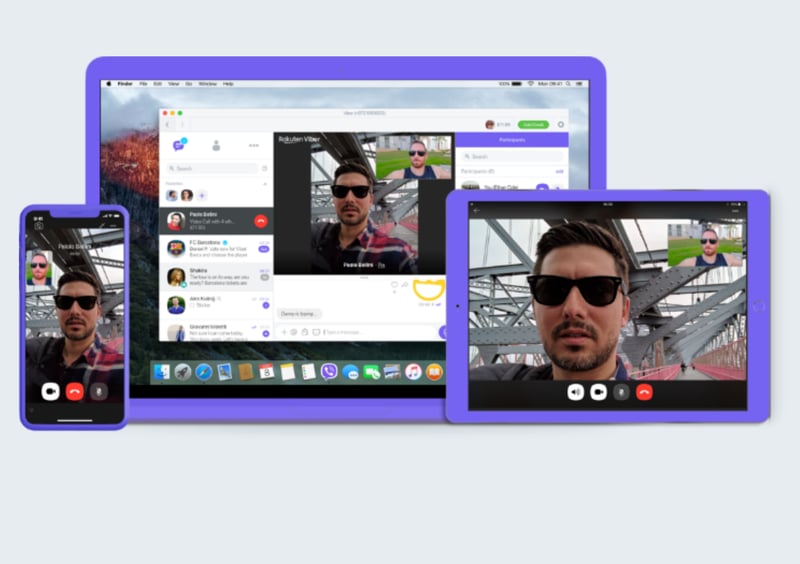
Viber offers lots of features, but is a nightmare for anyone intent on privacy and digital anonymity.
Features
Everything you can do with WhatsApp is possible with Viber. In addition, for a fee, it's possible to call contacts over landline. For anyone who is more playful, Viber offers a seemingly endless selection of stickers and emojis, as well as a shop for buying particularly chic creations. If you're bored, you can challenge friends to virtual games as well.
Risks
Unlike most other services we've looked at here, Viber's risks far outweigh its benefits. Anyone who uses Viber compromises their privacy and allows the company to gather as much data as it would like, not only from the individual user but also, from their friends and contacts.
End-to-end encryption
Lots of games
Gathers data about users and their contacts
Follows user social media activity
Conclusion
No one likes a snoop, whether an eavesdropper around the corner at work or a giant corporation on your smartphone. In an era where personal data has become a commodity, enhanced privacy is a unique selling point in a messenger app.
Even though WhatsApp and Viber have huge user bases and offer some protection, so far as privacy and data security are concerned, they're part of the problem. Owing to its lack of transparency, we also can't fully recommend Telegram either, even though it's easy to use.
For those who want to err on the side of caution, take Snowden's advice and use Signal. Should you be ready to invest a bit in your digital security, the Swiss service, Threema, places a premium on anonymity.











